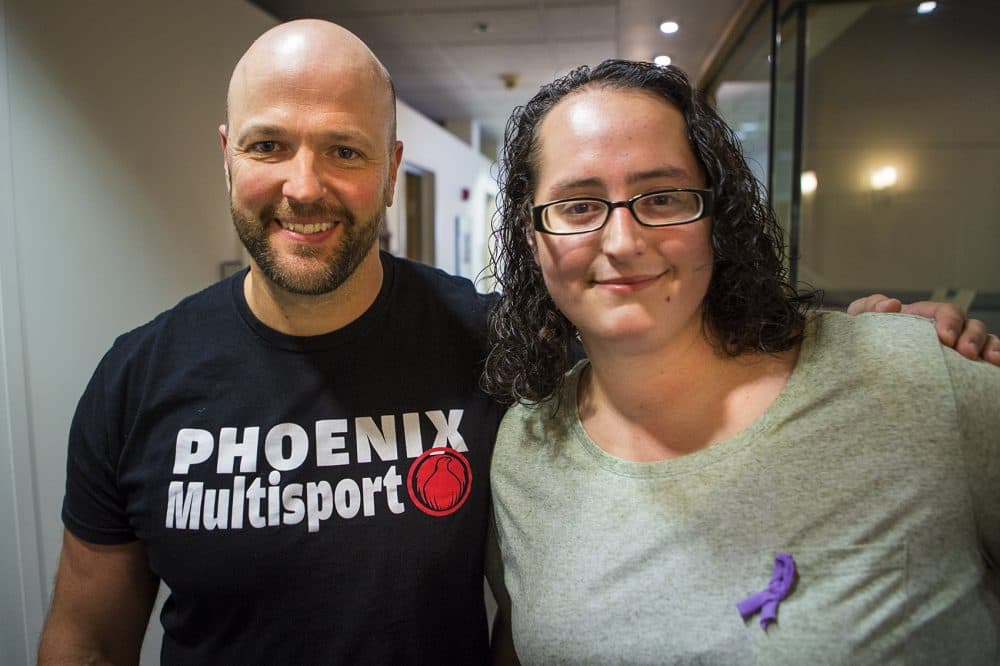Advertisement
In Boston, Opioid Hack-Athon Generates Novel Ideas To Fight Crisis

America is experiencing an unprecedented opioid epidemic.
On average, the U.S. Department of Health and Human Services says 78 people die from an opioid-related overdose every day. Prevention and treatment are key to fighting the crisis and new, innovative ideas in both areas are gaining traction in Boston after an opioid "hack-athon."
Here & Now’s Robin Young speaks with two of the hack-athon winners, Scott Strode and Aubri Esters, about the impact they hope to have with their projects.
Here's more information about Esters's MAT Mobile Van and Strode's "The 3rd Place" project.
Interview Highlights: Scott Strode & Aubri Esters
On their past experiences with addiction
Esters: "I was an active drug user for about seven years. I was injecting heroin daily, multiple times, and I was homeless. My life was absolute chaos at the time."
Strode: "I got sober here in Boston a little over 19 years ago, and for me it was cocaine and alcohol, but it was the early days of the opioid epidemic starting to surface. And actually once I got sober, I worked as an EMT and I got to see the other side of it. And I saw Oxycontin and these other drugs starting to emerge as opioid addiction grew."
On the necessity of the hack-athon
Strode: "I think it's beautiful that GE took this opportunity to pull together the hack-athon, to get diverse minds together and go at this issue again, because the current approach we're taking isn't working. And the issue only seems to be growing, so I think we need to look at it differently."
Esters: "People are literally dying in locked bathrooms, behind dumpsters, between cars, and the numbers are, right now, in Massachusetts, between 4 1/2 to 6 people a day die from accidental overdose, and that's pretty bad."
On their winning ideas at the hack-athon
Esters: "So, originally a group of us formed to work on harm reduction, and, in the greater sense, trying to help the most people in the highest drug-use neighborhoods, and we were looking into supervised consumption sites or supervised injection facilities. ... So, we came up with a group that wanted to work at both harm reduction by educating people about safer use and also providing treatment on demand to meet people physically where they are and where they are in the process of recovering.
"From my experience as a homeless person who was a drug user, I know that some people won't go to recovery centers because of the shaming and the stigma that's invovled, a lot of the times unintentionally from the providers there. And along with the fact that if they're not being reached out to by someone they trust, they may not want to look into the services they offer. So our idea is to have a van that goes around multiple sites around the city that have very high drug use and reach people on the street who are homeless and using.
"This would be doing, basically, the same things that a syringe exchange does, like needle exchange. Offering safer use supplies and education, along with treatment on demand, Suboxone induction. ... Suboxone and Methadone both have been proven to decrease a person's chance of dying from overdose in their lifetime by 50 percent and it saved my life personally. I stabilized my life. It keeps you from more risky behaviors and active use. It enables you to not be sick, keeps your brain working the way it does after drug use for a long time."
Advertisement
Strode: "I sort of took the concept of 'the third place,' which is sort of a community-building concept. It used to be barber shops and churches and barbecues at family events where people came together and supported each other as communities, but the recovery community doesn't really have that. We have recovery centers, but they're very similar in sort of in that treatment side, the institutional side of getting clean and sober. But then you're in recovery and there's this huge desert, there's a void. So we wanted to create a space that brought people together both early in recovery, loved ones or even first responders who needed to learn more about resources, they could come in and talk to recovery coaches that would be greeters at the front door. And if you're struggling and you want to get clean and sober you can come in and find access there as well. But it would also draw people that are in long-term recover already."
"I think that bringing people together who have some recovery time to be a support network for people that are new to the recovery journey is powerful because this enhanced bridging happens. People start to find a 12-step community. They start to find a good therapist. They hear somebody who's in long-term recovery talk about what it's like to do their trauma work, which was the root cause of my addiction, originally. And if you had a space where people came together, they could get healthy through yoga and fitness. They could get a job as a personal trainer or a mentor, as a coach. They could work in a cafe, maybe their first job in recovery. And they could also be a recovery coach greeting people at the door. And we put it in the heart of the city as a flagship that says 'This is a place of hope. We're investing in this. We believe in recovery.' And I think we can change that message and make Massachusetts the best place in the U.S. to be in recovery."
Guests
Aubri Esters, opioid hack-athon winner. She tweets @Aubri_Esters.
Scott Strode, opioid hack-athon winner and founder of Phoenix Multisport. He tweets @ScottAStrode.
This segment aired on September 26, 2016.
